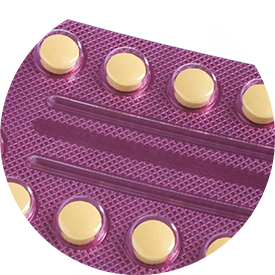Today there are many birth control options available…which one is right for you?
 Would you believe that there are almost 400 different birth control options on the market today? And each manufacturer wants you to think theirs is unique and special and is going to do a better job of keeping you from getting pregnant.
Would you believe that there are almost 400 different birth control options on the market today? And each manufacturer wants you to think theirs is unique and special and is going to do a better job of keeping you from getting pregnant.
Here’s a little inside secret, they are pretty similar. If used correctly, each birth control option provides you with a 99% effectiveness rate based on typical use.
In reality there are just a few key factors that help us help you find the right birth control.
- Do you want a product that uses estrogen, one that’s estrogen free or one that uses no hormones at all?
- How often do you want to have to deal with your birth control?
- Are you looking for temporary birth control or something permanent?
- With that said here are the basic options available today…
Short Term Birth Control
Oral Contraceptive (OCP) — Your Daily Option
There are 4 classes of OCP, which due to the amount of estrogen in each pill. For example: the mini-pill has no estrogen, there are low dose pills with 20 micrograms of estrogen, high dose with 30-55 micrograms of estrogen, and triphasics where the amount of estrogen varies throughout the cycle. End result, the higher the dose of estrogen the better cycle control but the risk of side effects increases which can included nausea, breast tenderness and headaches. The lower the estrogen the higher incidence of break through bleeding.
Ortho Evra Patch — Your Weekly Option
The birth control patch, commonly called by its brand name Ortho Evra, is a thin, square patch that sticks to the skin. The transdermal patch prevents pregnancy by releasing hormones (estrogen and progestin – the same hormones used in birth control pills) that prevent a woman’s ovaries from releasing eggs (ovulation). The hormones also thicken the woman’s cervical mucus, blocking sperm from joining an egg if one has been released. In addition, the hormones thin the lining of the uterus, which prevents a fertilized egg from attaching in the uterus. A new patch is placed somewhere on the body once a week for three weeks in a row. On the fourth week, no patch is used. The patch is used to prevent pregnancy, but like many other birth control methods, it does not protect against STDs (sexually-transmitted disease).
Nuva Ring — Your Monthly Option
The Nuva Ring is a small silicon ring that fits into your vagina. It’s a time-release device that slowly releases a small amount of estrogen and progestin. You wear the device for 23 days and then remove for 7 days. During these seven days you will have your regular period. This is similar to taking the placebo pills on a regular pill pack. The effectiveness is the same as OCP.
Injectable Depo Provera —Your 3 Month Option
Depo Provera is a very effective birth-control option that is injected usually into your arm or upper thigh muscle just once every three months. As another benefit, many patients report that after 2-3 doses of Depo Provera they begin to have light to almost absent periods. Possible side effects during the first few months of use include irregular spotting and weight gain.
Long Term Birth Control
Skyla® IUD — Your 3 year, non-estrogen option
Women desiring to avoid pregnancy without needing to bother with daily or weekly pills, can do so with Skyla. This FDA-approved intrauterine device (IUD) releases progestin locally to the uterus. Therefore, most of the release is concentrated to the uterus instead of being release throughout the body (as with taking pills). Skyla is easily inserted during an in-office visit. Skyla effects the uterus in several ways to inhibit pregnancy. Skyla impedes sperms’ movement, thins out the uterine lining, and actively decreases sperm survival rate. When combined, these pregnancy inhibitors result in a 99% effect treatment.
Because Skyla is extremely small and implanted in the uterus, users:
- Will not feel it during normal activities (or during sex)
- Can still use tampons normally
After Skyla is placed, our office will schedule a follow up appointment to ensure that it is inserted and performing correctly. You may be furnished with a back-up birth control before the checkup to avoid pregnancy. If at any time you desire to get pregnant, Skyla can be removed during a scheduled office visit. Many women are effectively using Skyla to prevent and plan pregnancy.
Nexplanon
Nexplanon prevents pregnancy in several ways. The most important way is by stopping the release of an egg from your ovary. Nexplanon also thickens the mucus in your cervix, and this change may keep sperm from reaching an egg. Nexplanon also changes the lining of your uterus. When the Nexplanon implant is placed correctly, your chance of getting pregnant is very low (less than 1 pregnancy per 100 women who use Nexplanon for 1 year). It is not known if Nexplanon is as effective in overweight women because studies did not include many overweight women.
Because contraception is automatic and does not depend on the user, the failure rate for Nexplanon is less than 1% for women who weigh less than 150 pounds.
Women who cannot take birth control pills for medical reasons should not consider Nexplanon a viable contraceptive option. The potential side effects of the implant include irregular menstrual bleeding, headaches, nervousness, depression, nausea, dizziness, skin rash, acne, change of appetite, breast tenderness, weight gain, enlargement of the ovaries or fallopian tubes, and excessive growth of body and facial hair. These side effects may subside after the first year.
Kyleena® IUD — Your 5 year, non-estrogen option
Kyleena® is a low hormone intrauterine device placed into the uterus. It is over 99% effective at preventing pregnancy for each year of use, and 98.6% effective over 5 years.
Kyleena® contains 19.5 mg of a single hormone called levonorgestrel, a type of progestin, that is often used in birth control pills.
Because Kyleena® slowly releases a continuous low dose of levonorgestrel into your uterus, only small amounts of the hormone enter your bloodstream.
The hormone, levonorgestrel, that’s released into your uterus by Kyleena® prevents pregnancy most likely by:
- Thickening cervical mucus, preventing sperm from entering the uterus
- Inhibiting sperm movement so it’s more difficult to reach and fertilize an egg
- Thinning the lining of your uterus, making it less likely for an egg to attach to the uterus
It is not known exactly how these actions work together to prevent pregnancy.
Mirena IUD — Your 6 year, non-estrogen option
Mirena is a hormone-releasing system, placed in your uterus to prevent pregnancy for up to 6 years. It’s made of flexible plastic and contains a progestin hormone often used in birth control pills. Though unlike many birth control pills, Mirena does not contain an estrogen. Mirena releases the hormone directly into your uterus so only small amounts of the hormone enter your blood. Mirena is 99.5% effective in preventing pregnancy without the hassle of taking a daily pill.
Paragard® IUD — Your 10 year, hormone-free option
Paragard Intrauterine Contraceptive (IUC) is more effective than the Pill and unlike the Pill, ring, and shots it’s hormone-free. In fact, it’s one of the most effective contraceptives available on the market today. It is currently the best option for women who prefer not to use hormones or cannot due to health reasons. It’s virtually hassle-free, no more daily or weekly routines—It’s requires just a simple monthly self-check.
Permanent Birth Control
Tubal Ligation —Your Permanent option
Tubal ligation is a permanent sterilization procedure performed under general anesthesia at an out-patient surgical center.
Because reversible contraceptive methods such as birth control pills are less than perfect for pregnancy prevention, many women choose tubal ligation. About 27% of women who had completed child bearing were relying upon tubal ligation for birth control. 9% of women relied upon their partner’s vasectomy for pregnancy prevention. Surgical tubal ligation is 99.6 – 99.8% effective. By comparison, male vasectomy is 99.9% effective.
Now that you have an idea of what is available, we encourage you to call us at 770-777-4933 and arrange for a personal birth control consultation with your doctor to determine which birth control option is right for you.


